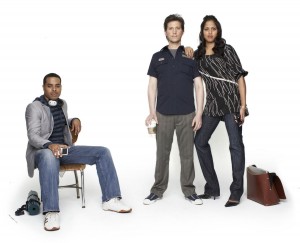-

BzzAgent is changing the way brands treat consumers Boston’s recent warm weather streak has brought the college students out of winter hibernation.
Stand in a high-traffic spot on any campus in town and you’ll see them. Armed with iPods and Blackberries, they are on the move and totally plugged in from the time they leave their dorms to the time they return. The question is, how do you interrupt them and get them to pay attention to your brand these days?
The answer: You don’t.
College students, the majority of the Generation Y population, will never be responsive to traditional advertising campaigns. They’ve become accustomed to the thousands of advertisements infiltrating their personal space on a daily basis, and they’ve learned to tune them out.
College students aren’t the only consumers out there, no. But they’re a big demographic that a long list of people are trying to reach. Marketers have unsuccessfully tried over and over again to target this crowd, which has been accused of being unresponsive and entitled. Is marketing to Gen Y a lost cause?
No. It’s not a lost cause, but it will forever remain a challenge — a challenge that Boston startup BzzAgent helps clients like Dunkin Donuts, National Geographic, and Lee Jeans face every day. Instead of forcing advertisements on consumers, BzzAgent is taking a different approach and are letting the consumer do the talking. Dave Balter, Founder and CEO of BzzAgent gave me the breakdown of how his company works on a telephone interview this week.
Companies pay BzzAgent to connect them with consumers who will help them get the word out and give them feedback on their new products or websites. Consumers sign up for to be an “agent” for free, after BzzAgent gets an idea for who the customer is (income, gender, interests, etc.) they send them a product free of charge to try-out. All the agent then has to do is spread the word about the product to their social circle whether it be in person or online. They are encouraged to give their honest opinion and constructive feedback about the parts of the product they had issues with.
It’s a win-win for both the agents (consumers) and the companies involved (BzzAgent’s clients). The customers are getting free swag and the chance to check out up-and-coming websites. At the same time, “brands are getting quicker about solving problems; they are able to listen to the customer and respond much faster,” Balter explained. This is a well and good for the consumer and the company, but is this how marketers are going to tap Generation Y?
I believe it is.

I am in my third year at Northeastern, so I am something of an expert on Generation Y college students. I’ll admit to two things: We’re lazy and, probably, a bit entitled. Taking both of those into consideration, will Gen Y work with companies like BzzAgent to create hype around the brands they’ve tried to avoid for so long? Yes, as long as companies listen to us and take our advice. I asked Dave Balter to weigh in on the Gen Y issue and here’s what he had to say:
“You [Gen Y] are not going to stand for old marketer’s tricks anymore. It just won’t work. Unless you feel you’re being treated fairly, being listened to, and your voice has the power to make a change, you won’t pay attention. I think marketers have learned to get in touch with you; they have had to level the playing field and be one with the consumer.”
Balter has a point. Generation Y has taken a beating from both the media and many of the generations that came before, so the idea that we’re being treated fairly and being listened is bound to feel awesome. Gen Y has become defensive about being told what to like and what to do, because there’s so much info flying at us. Trends are more pervasive. BzzAgent has helped and will continue to help Gen Y let our guard down.
BzzAgent is more then a marketing agency, they are also making an impact on society; they’re changing the way brands treat consumers.
Balter also helped me look at this strange, unique dynamic from a corporation perspective; “[These companies] are trying to figure out how to sell more product; we activate consumers to engage and share their opinions to others around them. You can rapidly increase the sales of your product when you activate the consumer.”
BzzAgent is the closest thing to a happy medium between companies and Gen Y. Instead of trying to change consumer behavior, BzzAgent it embracing it. Young people can still spend time on their favorite online social networks and hangout with friends; we’re simply encouraged discuss and give feedback on the products BzzAgent as connected with them for free. Customers are getting free goodies and are able to voice their opinions, while companies are learning much faster how to improve their products.
In a way, the whole scenario makes it possible for Gen Y-ers to remain insulated from public pressure and stay tapped into their trusted, local circles for advice on what to purchase.
BzzAgent and other companies following their model will begin to replace traditional advertising agencies in the near future. They’re reaching a consumer who wouldn’t be reached otherwise through traditional marketing and companies cannot ignore that fact. Generation Y has ignored brands long enough, but mark my words: BzzAgent, or someone else who follows them down this new path will change that.
What do you think about BzzAgent’s approach to marketing? Is this kind of activity sustainable long term? If more marketing dollars fall off of billboards and out of magazines and into the hands of consumers in the form of freebies, what effects will that have economically? Let us know in the comments.

